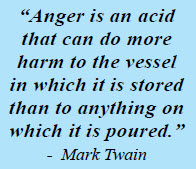Is Anger Harming Your Health?
 By: Lisa Philippart
By: Lisa Philippart
In my last article, we explored the nature of anger as a “secondhand” emotion, often used to express feelings of pain. Today, I will be exploring the ways that anger may be affecting your physical health…and it’s not in a good way. Have you known people who seem habitually angry? As I acknowledged previously, sometimes anger can be good for you, if it’s addressed quickly and expressed in an appropriate manner. In fact, for some people anger can help them to think more rationally. Most of us can understand that holding anger in, turning anger inward, or exploding in anger can have a negative and possibly prolonged effect on our bodies. Let’s take a look at a few ways that anger may be doing harm to your physical health and overall well-being.

If you’re mad all the time, you just may discover that you also seem to be sick more often. Anger weakens your immune system. In a recent Harvard study, scientists discovered that healthy people who simply recalled an angry experience from their past caused a 6-hour dip in levels of antibody immunoglobulin A, which is the cell’s first line of defense against infection. Anger could be hurting your lung capacity. In another Harvard study, a large group of men were asked to measure their anger levels, and then changes in their lung functions were assessed. Men with the highest hostility ratings showed significantly worse lung capacity, which in turn lead to more respiratory problems. The researchers believed that the chain of events, increased anger, led to a surge in stress hormones, which created inflammation in the lungs’ airways.


Outbursts of anger put your heart at risk. Dr. Chris Aiken, a clinical psychiatry instructor at Wake Forest University School of Medicine, reported that in the two hours after an anger outburst, the chance of having a heart attack doubles! He also discovered that those people who tend to be anger prone have twice the risk of coronary diseases as their calmer peers. Anger explosions increase your risk for stroke and decrease brain function. Following an anger outburst, your brain may react in potentially lethal ways. One study reported a three times higher risk of stroke from a blood clot to the brain or a brain bleed in the two hours after a rage explosion. Another negative effect of anger on the brain is the increased cortisol levels which creates a loss of neurons in the pre-frontal cortex. This is the area of the brain associated with executive function and appropriate social behavior.
Is it true that happy people live longer? Anger can shorten your life. A longitudinal study of couples found that those who fought frequently were more than twice as likely to die at a young age as did those couples who rarely fought. And those who fought frequently with friends were at an even greater risk. Fighting friends were 2.6 times more likely to die prematurely than those who got along with their pals. Worst of all were persistent fights with neighbors! These types of argumentative relationships created a risk of three times the likelihood of dying prematurely. Bottom line: Your body will thank you if you can learn to decrease your anger and calm down. My next article will address ways to do just that.
By: Lisa Philippart
Licensed Professional Counselor